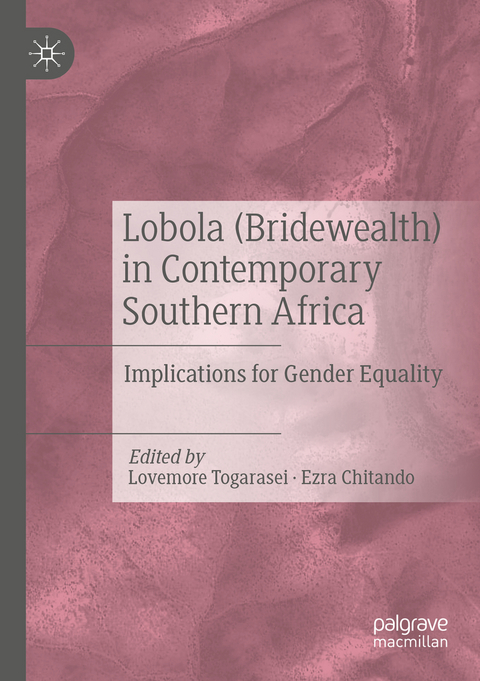
Lobola (Bridewealth) in Contemporary Southern Africa
Springer International Publishing (Verlag)
978-3-030-59525-8 (ISBN)
This volume explores the multiple meanings and implications of lobola in Southern Africa. The payment of lobola (often controversially translated as 'bridewealth') is an entrenched practice in most societies in Southern Africa. Although having a long tradition, of late there have been voices questioning its relevance in contemporary times while others vehemently defend the practice. This book brings together a range of scholars from different academic disciplines, national contexts, institutions, genders, and ethnic backgrounds to debate the relevance of lobola in contemporary southern African communities for gender equality.
lt;p> Lovemore Togarasei is Professor of Theology and Religious Studies (Biblical Studies and African Christianity) at the University of Botswana.
Ezra Chitando is Professor of History and Phenomenology of Religion at the University of Zimbabwe and Regional Coordinator of the World Council of Churches Ecumenical HIV and AIDS Initiatives and Advocacy.
Introduction Lovemore Togarasei (University of Botswana) and Ezra Chitando (University of Zimbabwe).- Part 1: History of Lobola Chapter 1: Bridewealth in Southern Africa: Origin, Functions, Rights, and Gender-based Violence John Chitakure, The Mexican American Catholic College.- Chapter 2: Roora/Lobola: Its language, meaning and function: A keystone of Shona culture Francis Matambirofa, University of Zimbabwe.- Part 2: Lobola and/in Sacred Texts and Literature.- Chapter 3: The Bible and Lobola Lovemore Togarasei, University of Botswana.- Chapter 4: The Jewish and Shona Perspective of Lobola: A Critique Francis Machingura and Liveson Tatira, University of Zimbabwe.- Chapter 5: The biblical and cultural bases for lobola in light of marriage and divorce in the African context Eliot Tofa, University of Eswatini.- Chapter 6: Disempowerment of men by men? A comparative analysis of the impact of lobola and the Muslim mahr on masculinity.Edmore Dube, Great Zimbabwe University.- Chapter 7: Mari Yedanga Takadya Kare!: Lobola and Femininity of Entrapment in ChiShona Literature Beatrice Taringa, Belvedere Teachers' College, Zimbabwe.- Part 3: Lobola Practices in Some Southern African Communities Chapter 8: Bogadi Practice and the Place of Women in the Botswana Society Fidelis Nkomazana, University of Botswana.- Chapter 9: Lobola: A Paradoxical Token of Appreciation in Modern Day Ndebele Culture Sambulo Ndlovu, University of Cape Town.- Chapter 10: African Culture, Globalisation and Conformity: A Critical Review of the Vhaven a Lumalo Practice in Zimbabwe Silibaziso Mulea, Great Zimbabwe University.- Chapter 11: A Critical Assessment of Lobola Marriage Practices in Malawi: Mzimba South Case Study Mastone Mbewe, University of Malawi.- Chapter 12: Dynamics of Lobola practices among Vatsonga in Zimbabwe Madlome Steyn Khesani, Great Zimbabwe University.- Chapter 13: Metaphorical use of mapere (hyenas) in ku-roora (wife acquisition) related practices among the Shona peoplein Zimbabwe Benard Pindukai Humbe and Excellent Chireshe, Great Zimbabwe University.- Chapter 14: Commercialisation of Marriage Rites in Contemporary Times: The Discourse of Lobola in the public Sphere in Zambia Nelly Mwale and Joseph Chita, University of Zambia.- Chapter 15: Intersection of lobola, intimate partner violence, and love among Karanga Christians in Chivi District, Zimbabwe Excellent Chireshe, Great Zimbabwe University.- Part 4: Philosophical and Theological Reflections on the Practice of Lobola.- Chapter 16: An inquiry into the value of human life: The lobola perspective Clive Tendai Zimunya and Chipo Hatendi, University of Zimbabwe.- Chapter 17: Contextual African theological interpretation of lobola in the era of globalization Moji A. Ruele, University of Botswana.- Chapter 18: Lobola and Gender Equality: A Theological Hermeneutic Approach Blazio M. Manobo, Catholic University of Zimbabwe.- Part 5: Ir/relevance of Lobola in Contemporary Southern Africa.- Chapter 19: No to bride price/bride wealth, Yes to roora Nisbert T. Taringa and Godfrey Museka, University of Zimbabwe.- Chapter 20: Bride price: a stumbling block to women's advancement and development Loise Mudhosi, Independent scholar, Zimbabwe.- Chapter 21: Our debt to our parents?: Perspectives on Lobola Clive Tendai Zimunya, University of Zimbabwe.- Chapter 22: Creating alternatives to the practice of lobola in contemporary Southern Africa Mookgo Solomon Kgatle, University of South Africa.- Chapter 23: "Marujata", "Jojina" and "Achihera": Celebrating Women's Agency in the Debate on Roora in Shona Culture Ezra Chitando, University of Zimbabwe.
| Erscheinungsdatum | 05.02.2022 |
|---|---|
| Zusatzinfo | XIV, 378 p. |
| Verlagsort | Cham |
| Sprache | englisch |
| Maße | 148 x 210 mm |
| Gewicht | 511 g |
| Themenwelt | Geisteswissenschaften ► Religion / Theologie ► Weitere Religionen |
| Schlagworte | amalobolo • bogadi • Jojina • Marujata • roora |
| ISBN-10 | 3-030-59525-0 / 3030595250 |
| ISBN-13 | 978-3-030-59525-8 / 9783030595258 |
| Zustand | Neuware |
| Haben Sie eine Frage zum Produkt? |
aus dem Bereich


